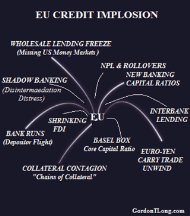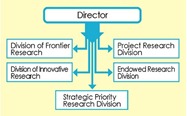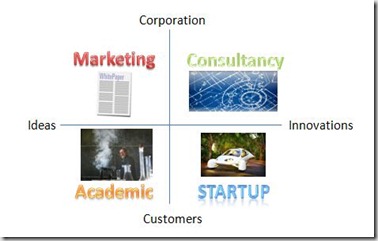The European straw man
 It’s always interesting to immerse back into the turbulence of US media after months away. The economy is Topic One on the news and talk shows, television and radio, money or politics. And, whether looking behind for reasons or ahead for alternatives, the next sentence is always the same.
It’s always interesting to immerse back into the turbulence of US media after months away. The economy is Topic One on the news and talk shows, television and radio, money or politics. And, whether looking behind for reasons or ahead for alternatives, the next sentence is always the same.
With the Eurozone teetering on the brink of collapse…
Although I think it’s a comfort for Americans to believe that they are weathering a storm gusting in from across the ocean, it seems like more myth and distraction than cause-and-effect.
The worst outcomes of the Eurozone crisis leads to some form of restructuring or abandonment of the euro as a common currency, not the bankruptcy of Europe as a whole or the fall of its sovereign nations. There will still be European production, consumers, financial centers, and governments.  Border controls may re-emerge, economic buffers proliferate, and local regulators re-assert, but it’s more likely to be a painful adjustment than a total collapse.
Border controls may re-emerge, economic buffers proliferate, and local regulators re-assert, but it’s more likely to be a painful adjustment than a total collapse.
And, despite the scenes of riots against imposed austerity programs and the rotation of prime ministers throughout the southern margins of the Union, no country is descending into anarchy or civil war. The trains still run (perhaps a bit more grimy and irregular), the banks are all open (although quick to impose a new fee at every turn), and the grocers and shops are filled with goods (and shoppers who are buying them). There’s frustration and apprehension, but not widespread privation.
…a consequence of socialist economic policies…
At home, politicians have developed a shorthand that links Europe Collapse to Socialism to Obama. The links are forged from stimulus spending, healthcare reform, and bank bailouts, all policies demonstrated to have failed on the Continent.
Only they haven’t. Bank breakups in the Netherlands have eliminated “Too Big To Fail” institutions without harming competitiveness. Universal mandates and cost controls result in my paying$150 per month for Dutch health insurance (In the US I pay $2500 per month, more than my daughter’s college bill). Interest rates on Dutch bonds is 2.1%, Germany 1.8%; unemployment is 5%, and they retain their AAA bond rating.
Still, Europe remains a favorite target this campaign season.
“We have a choice in America to be remaining a merit-based opportunity society that follows the Constitution, or to follow the path of Europe. And I'm the guy who believes in the former. I believe America got it right. I believe Europe got it wrong. I believe America must remain the leader of the world. . . . I am absolutely committed to an American century. I see this as an American century." -- Mitt Romney, WSJ, 24/12/11
I think that if the US were to simply acknowledge and address both our problems and potential honestly, we could accomplish far more. “What cathedrals will our generation build?” asked one commentator: Where has American confidence gone, our willingness to come together as a nation to take on a task larger than ourselves? In science, art, infrastructure, economics, production, the US has always been outward looking, optimistic, free to take the best and adapt the rest from global cultures, giving back products and ideas that change the world, and ultimately to create a virtuous circle of success.
 Returning home, I see a surly shifting of blame, loss of confidence in institutions, hoarding of resources, and division of people by class, geography, and party. There are an astounding number of unchallenged untruths being told.
Returning home, I see a surly shifting of blame, loss of confidence in institutions, hoarding of resources, and division of people by class, geography, and party. There are an astounding number of unchallenged untruths being told.
And how stupid is that? Very.
Pundits and politicians erect simple straw men as convenient rationalizations for genuine hardships and inequalities. But the world isn’t really anything like the one they depict.
As a start, don’t believe any of the straw men illustrated on this page.
Labels: Economics, US Perspectives










